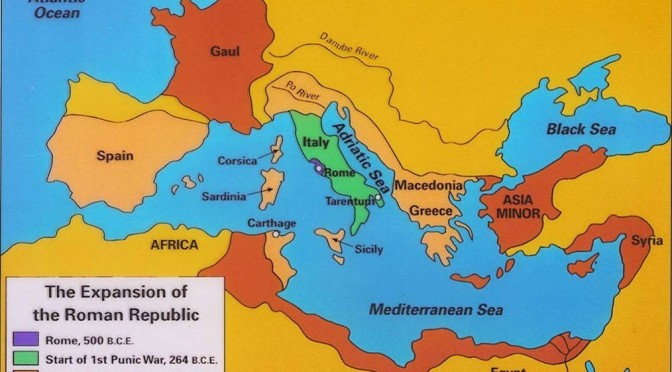The East
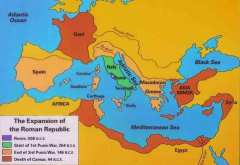 In Hispania rome was forced to fight a long drawout battle to gain control of the whole peninsula. In the meantime, in the East Rome defeated Macedonia and Greece and advanced across Anatolia (modern Turkey) absorbing quite rapidly the North Western part of what had been Alexanders empire. Macedon, Greece, Rhodes, Pergamon, Bithnia, Pontus, Judah, Syria and Egypt were all remnants of the Empire of Alexander the Great. These were not tribes, they were Hellenic city states, some of which had progressed to nationhood.
In Hispania rome was forced to fight a long drawout battle to gain control of the whole peninsula. In the meantime, in the East Rome defeated Macedonia and Greece and advanced across Anatolia (modern Turkey) absorbing quite rapidly the North Western part of what had been Alexanders empire. Macedon, Greece, Rhodes, Pergamon, Bithnia, Pontus, Judah, Syria and Egypt were all remnants of the Empire of Alexander the Great. These were not tribes, they were Hellenic city states, some of which had progressed to nationhood.
They all took part in the Olypmic games in which the pleasure of competing was accompanied by a desire to demonstrate superiority.
They all had the belief that they were the rightful successors of Alexander and therefore in competition with each other. The Egyptians also believed they were the rightful successors of the Pharohs and the Syrians (Sassanids) believed they were the rightful successors to the Persians. A dangerous mix. Intermarriage, diplomacy, intrigue and treachery were all used as weapons in their struggle to achieve superiority.
Though part of this Hellenic world Judah was very different. In Judah, Alexander was perceived as evil, perhaps the embodiment of the devil.
Greek Culture
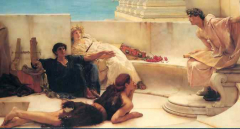 After the wars with Carthage,once the Romans had found themselves catapulted into Hellenistic politics their tactic was to become Greeks, to become yet another successor to Alexander and therefore an equal competitor for Alexander’s Empire. In Rome, the patricians spoke Greek at home because it is a far more subtle language than Latin. A tradition developed whereby Rome saw themselves as not only successors to Alexander but inheritors of Greek Culture.
After the wars with Carthage,once the Romans had found themselves catapulted into Hellenistic politics their tactic was to become Greeks, to become yet another successor to Alexander and therefore an equal competitor for Alexander’s Empire. In Rome, the patricians spoke Greek at home because it is a far more subtle language than Latin. A tradition developed whereby Rome saw themselves as not only successors to Alexander but inheritors of Greek Culture.To the Hellenistic states the concept of a King or Emporer as the owner of a state was familiar and acceptable. Though a republic Rome accepted this and Client Kings were not only accepted but encouraged.
Gradually many of the Hellenistic states came to believe that Rome was the rightful leader of their extended family. Some had to be “pursuaded” to give up their independence but the kings of Pergamon, Bythnia and Egypt all bequeathed their nations to Roman rule.
There were other nations who did not accept Roman intrusion. Pontus, Parthia, successor to the Persians and Judah, all gave great resistance to Roman expansion. Parthia, over time had the better of its never ending conflicts with Rome which were often fought over the territory of the unfortunate Armenians. Three famous Parthian victories were over Mark Anthony, Crassus who was killed in battle and much later Valerian , who was captured and spent the rest of his life as a slave.
Herod
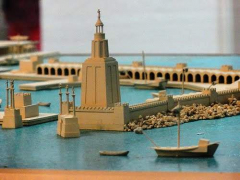 Perhaps the most obvious example of a client king was the Herodian family in Judah. Not able to find a suitably compliant candidate from amongst the Maccabe rulers, Rome, specifically Mark Anthony, invented a new royal family gave them a suitable genealogical background and arranged marriages to justify their appointment. King Herod’s building programme symbolised the centralisation of wealth, the harbour at Caesarae, the palaces at Herodium and Masado the city of Tiberius all masterpices of the application of roman technology but clearly designed to provide status and prestige for the king.
Perhaps the most obvious example of a client king was the Herodian family in Judah. Not able to find a suitably compliant candidate from amongst the Maccabe rulers, Rome, specifically Mark Anthony, invented a new royal family gave them a suitable genealogical background and arranged marriages to justify their appointment. King Herod’s building programme symbolised the centralisation of wealth, the harbour at Caesarae, the palaces at Herodium and Masado the city of Tiberius all masterpices of the application of roman technology but clearly designed to provide status and prestige for the king.
Two Empires
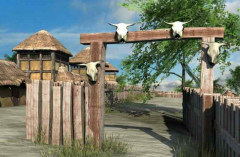 In the West it was totally different. There were no grand edifices for the high kings. The Romans came to recognise that the Celts, though they had leaders of each tribe and these leaders competed for the title of “High King” the lands and resources belonged to the people and the kings represented the people rather than owned the people. It was a very familiar concept to Romans. At least initially they willingly accommodated the Celtic culture. The Celtic tribes’ concept of a High King , someone who represented the interest of all celts was one of the major triggers for inter clan rivalry and conflict. It was a position of great prestige rather than power but the competition to attain this position was fierce and was often but not always resolved by war
In the West it was totally different. There were no grand edifices for the high kings. The Romans came to recognise that the Celts, though they had leaders of each tribe and these leaders competed for the title of “High King” the lands and resources belonged to the people and the kings represented the people rather than owned the people. It was a very familiar concept to Romans. At least initially they willingly accommodated the Celtic culture. The Celtic tribes’ concept of a High King , someone who represented the interest of all celts was one of the major triggers for inter clan rivalry and conflict. It was a position of great prestige rather than power but the competition to attain this position was fierce and was often but not always resolved by war
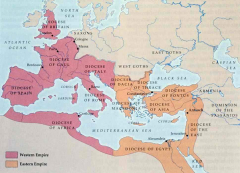 Thus Rome found itself with two empires.The Romans devised different strategies, laws and administrations for these two empires. Their govenors, generals and eventually their emperors came to specialise in one zone or the other. The dividing line between these two empires was somewhere in Illyria ( modern Croatia but before the Slavic invasions) so it is not surprising that the Illyrians found the strategies and initiatives particularly difficult to understand.
Thus Rome found itself with two empires.The Romans devised different strategies, laws and administrations for these two empires. Their govenors, generals and eventually their emperors came to specialise in one zone or the other. The dividing line between these two empires was somewhere in Illyria ( modern Croatia but before the Slavic invasions) so it is not surprising that the Illyrians found the strategies and initiatives particularly difficult to understand.
The empire was split again and again into east and west; between Caesar and Pompey, Octavian and Mark Anthony, Marcus Aurialus and Lucius Verus and more permanently after Diocletion’s reforms. These arrangements were not simply to ease communication over a huge area but to accomodate the different needs and expections of the two halves of the empire.
Not only was the Empire subdivided but a tradition of rivalry between east and west was quickly established
Holy of Holies
 Pompey distinguished himself by victories over Quintus Sertorius in Hispania, followed up by defeating the Pirates who plagued the Eastern Mediterraneum. He then defeated Mithridates of Pontus, Antochius of Syria and Aristobulus of Judea .
Pompey distinguished himself by victories over Quintus Sertorius in Hispania, followed up by defeating the Pirates who plagued the Eastern Mediterraneum. He then defeated Mithridates of Pontus, Antochius of Syria and Aristobulus of Judea .Whilst in Jerusalem he forced his way into the holy of holies. this act in itself guaranteed continuing resistance to Roman Rule.
Cleopatra
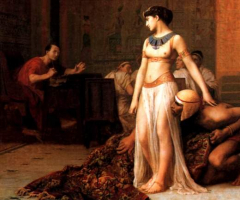 In the meantime Caesar had become powerful himself, building a large army for his conquest of Gaul. He marched his army on Rome despite the fact that Pompey had been appointed sole consul and had forbidden him to do so. Pompey lost his nerve, fled from Rome to Greece and despite having the larger army, was defeated at Pharsalus, fled again to Egypt and was there murdered by Romans in the service of Ptolemy XIII.
In the meantime Caesar had become powerful himself, building a large army for his conquest of Gaul. He marched his army on Rome despite the fact that Pompey had been appointed sole consul and had forbidden him to do so. Pompey lost his nerve, fled from Rome to Greece and despite having the larger army, was defeated at Pharsalus, fled again to Egypt and was there murdered by Romans in the service of Ptolemy XIII.
Pompey’s two sons and the survivors of Pompeys legions made their way back to Hispania where in 45 BC, as he knew he must do, Caesar finally defeated them and established his superiority.
Briefly Caesar became dictator of Rome. He also met and married Cleopatra, Egypt’s queen and she gave him a son.
He was assasinated in 44 BC because the senate identified that he now represented the interests of the both the Celtic world and Egypt not the interests of the Patrician families.
